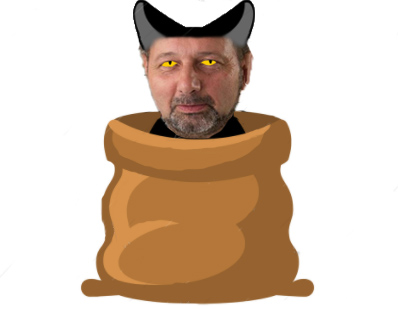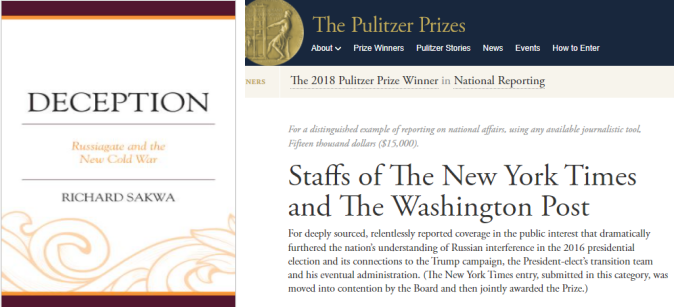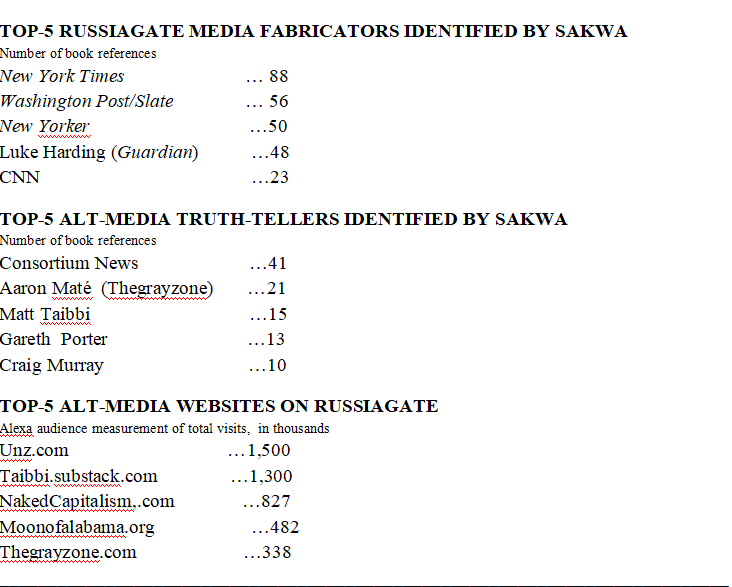

By John Helmer, Moscow
@bears_with
About the Russiagate operation that continues in the US, Richard Sakwa (lead image), a professor at the University of Kent, has gotten one thing right and one thing wrong. The wrong turns out to be the same thing as the right.
Russiagate, he says, defining that as the narrative of Russian interference in US politics in support of Donald Trump, “is one of the most mystifying yet consequential events of our time.” At the same time, Russiagate is a propaganda and deception operation aimed at achieving the political interests of the Democratic Party, their candidates and supporters. “What if Russian actions during the 2016 were minimal and defensive, and there was no grand plot”, Sakwa asks rhetorically, not quite agreeing to answer for himself. “In that case the endless years of the Russiagate scandal, in which every scrap of evidence was portrayed as the ‘smoking gun’ before being discredited” turn out to be “deception.. defined as the deliberate attempt on the part of leaders to mislead the public about the thrust of official thinking… Such deceptions are now routine in US politics.”
A deception cannot be either mystifying or consequential if it’s routine. But if the Russiagate operation is routine, then the truth of the narrative doesn’t stop the repetition, and the falsehood doesn’t matter to the public. Accordingly, the New York Times insists it will continue reporting under its headline of last week: “Why the Discredited Dossier Does Not Undercut the Russia Investigation?”.
The newspaper knows this is a successful money-making formula; indeed, it admits it is making more revenue than ever, and more profit too. “This was our best third-quarter performance in both News and total net subscription additions since the launch of the digital pay model more than a decade ago,” the company’s chief executive announced on November 1; “and, outside of 2020, our best quarter ever for digital subscription additions.” With 90% of the New York Times’ subscriptions now digital, the management is convinced that fake news is profitable – that clickbait works. New York Times reporters won’t retract or apologize for lying when the lies generate bigger dividends for the shareholders, bigger bonuses for management and reporters.
Nothing new about this. What is new is the behaviour of the alternative media in marketing their truth of the Russiagate story. Sakwa has made his book out of balancing what the mainstream media fakers have reported and what the alt-media reporters have to report of the truth. The audience measures, subscription numbers, and balance-sheets of the alt-media are more secret than publicly owned media companies but the marketing tactics are the same – they report the truths which make the mainstream media out to be liars; they repeat this over and over for clickbait effect.
Sakwa hasn’t interviewed a direct source for anything in his book. He appears not to know US government officials or Russian government officials, lawyers or detectives. He acknowledges his limitation with this excuse — “the fundamental methodological problem [is] that we still do not know what really happened. Much of the relevant material remains classified.” So his book is composed of secondary-source quotes from one side or another – from liars and truth-tellers carefully balanced.
But what’s the point of Sakwa’s balance? Do lies get less false by balancing them against the truth? Does the truth get weaker or stronger by balancing them with lies? Is the reader to be persuaded arithmetically – by the number of secondary views cited on one side or the other of the veracity line?
The answer, yes or no, to these questions is so obvious, it should be reckoned silly to ask them. But why is Sakwa selling his 555-page book for the premium price of $120; or to be less capitalistic, why should a reader pay? That’s a rhetorical question.
So why read on? To see the paradox Sakwa seems not to have spotted.
On the one hand, as Sakwa did notice in passing, American voters don’t think the Russiagate story, or in fact anything to do with Russia, is of any importance to the way they have recently voted or will vote at presidential or congressional elections. On the other hand, as the balance-sheet of the New York Times proves every quarter, the voters who read such newspapers will keep paying to be persuaded or deceived – and then disregard the Russian material when they vote.
Put these two parts of the paradox together, et voila! the conclusion is that Russiagate has proved to be a commercially profitable plot of the media, alt-media no less than mainstream media, which has satisfied no one and stopped nothing from being repeated over and over.
That’s also definition of the money shot in pornography. By that standard, Russiagate turns out to be the longest wank in American history (Sakwa’s too).

Left: Sakwa’s book is published in the US; click to read. Right: the official Pulitzer Prize announcement of 2018 awarding the prize jointly to reporters of the New York Times and Washington Post for “ deeply sourced, relentlessly reported coverage in the public interest that dramatically furthered the nation’s understanding of Russian interference in the 2016 presidential election and its connections to the Trump campaign, the President-elect’s transition team and his eventual administration.”
Sakwa’s method reflects his reading preference, not the forensic requirement of proving beyond reasonable doubt (the criminal court standard) or on the balance of probability (civil court standard). This also leads Sakwa to an imbalance between the number of his source quotes and references to the faking mainstream media and to the truth-telling alt-media. This imbalance is almost three to one – 265 references to the mainstream media, just 100 to the alt-media. Also, Sakwa’s choice of alt-media is personal; it bears little relationship to the size of the audience who reads them, and even less relationship to the truth value of their investigations.

There are mainstream media sources whom Sakwa appears to believe to be telling the truth. For example, he cites Catherine Belton’s reporting in the Financial Times and in her recent book, Putin’s People, for the story of Trump’s commercial interests in Russian real estate projects “exploiting his vanity and financial vulnerability long before he assumed the presidency” and creating thereby “the Kremlin’s financial hold over him”. Sakwa fails to report that the book is on trial in the London High Court, and has already been discredited by an out of court settlement and by a court ruling which appeared shortly after Sakwa’s book appeared.
Sakwa doesn’t exactly endorse Belton’s theory of the KGB mastermind behind Russian behaviour. He does credit the theory of GRU manipulation. “The GRU shares foreign intelligence concerns with the civilian SVR and the FSB’s counter-intelligence divisions. Of them all, it is the GRU that in recent years has gained a reputation for recklessness, including the hack of the DNC and the attempted killing of Sergei and Yulia Skripal in Salisbury, England, on 4 March 2018 and the attempted assassination of the oppositionist Alexei Navalny in Tomsk on 20 August 2020.” Never mind that Sakwa has confused the allegation of the GRU role in the Skripal operation with the alleged FSB role in the Navalny operation. He allows the GRU’s “reputation” to appear as if he believes it to be the truth – and provides no evidence to indicate otherwise.

Left to right: Yulia Skripal, Sergei Skripal; the GRU emblem; the FSB emblem. In Sakwa’s reading of the media on the Novichok operations, he fails to distinguish between the propaganda versions of which Russian secret service attacked which target.
Sakwa doesn’t refer to Skripal or Navalny again; he never mentions Novichok at all. These are telling omissions because in anti-Russian propaganda terms, the two Novichok operations have been far more successful in the UK and Germany than the Russiagate operation is proving to be in the US – the fabrications less challenged in the English and German media, less tested in the courts.
Indeed, Sakwa fails to notice that in the US the courts have played a more independent, truth-adjudicating role than the British courts have played (continue to play) in the Julian Assange case, which ought to be considered another deception operation as powerful as the Novichok operations. In these two British cases – the trials of Assange and the inquest into the death of Dawn Sturgess – the collusion between the secret services, police, prosecutors, media, courts, and the political leadership (both ruling and opposition parties in the UK) has been demonstrable – and effective. By the democracy standard, the US record in challenging and resisting the Russiagate operation is stronger than the British performance on Assange and Novichok.
Sakwa doesn’t want to go so far. He refuses to concede that on the side of the Atlantic where he makes his living, or on the other side which he portrays in this book, there might be “the concept of the deep state as an organised conspiracy by some sort of cabal.” That is “mistaken or misleading”, he concludes without presenting his evidence. Instead, he says there are “a disposition and a defined set of policy preferences”.
More than that, Sakwa draws the one conclusion he hasn’t found in either mainstream media reporting on Russiagate, or in the parallel alt-media reporting. “There was no organised ‘deep state’ collusion,” he concludes, “let alone an organised resistance movement, but the myriad of uncoordinated actions, prompted mostly by genuine concerns about an external threat and the erosion of executive accountability rooted in the strucural power of the Trumanite state and the ideological context of the new cold war”.
Sakwa also concludes that “the conditions that gave rise to Trump remain and only when they are addressed will the crisis be resolved. Overcoming the Russigate syndrome is no easy task, but the greater challenge is to address its causes. For that new politics is required that breaks out of cold war thinking at home and abroad. Trump is the destructive solution to the problem, while constructive ones await convincing articulation.” .
On that last line Sakwa strikes his final balance between wishful thinking and impotence. In a professor, that’s a failure of conviction in getting to the truth. It’s also professional cowardice.











Leave a Reply